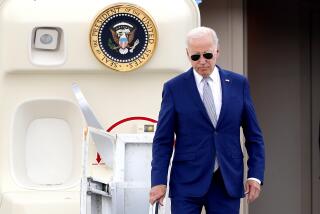Seoul won’t intercept North’s ships
- Share via
HANOI — President Bush failed this morning to win South Korea’s commitment to intercept North Korean vessels as part of the U.S.-led effort to stop Pyongyang’s atomic weapons program and prevent the spread of its nuclear technology.
But South Korean President Roh Moo-hyun did express support for the effort to counter Pyongyang, and the nation has already agreed to other parts of the plan.
U.S. officials portrayed the meeting as achieving its goal: smoothing over differences that have emerged between Washington and Seoul in the wake of North Korea’s test explosion of a nuclear device on Oct. 9.
The differences between the United States and South Korea pertain to enforcement of a U.N. Security Council resolution intended to pressure North Korea to give up its nuclear ambitions, an issue that dominates Bush’s five-day Asian tour.
After about a one-hour meeting here -- where Bush, Roh and the leaders of 19 other countries are gathered for the annual summit of the Asia-Pacific Economic Cooperation forum -- Roh confirmed that his country could not commit to potential military action in the form of boarding North Korean ships in regional waters.
Seoul already has agreed to enforce restrictions on travel and financial transactions.
A senior White House official, speaking on condition of anonymity because he was discussing a diplomatic meeting on which Bush had spoken publicly, said that interdiction within Korean waters was a matter covered by agreements reached by the two countries on the Korean peninsula, and that the South was “not going to be able to publicly sign on to interceptions.”
Interdiction would also pose political problems for Roh, who faces limited support for his governing party and concerns within the country over causing a direct confrontation with the North.
At a photo session after the meeting, Bush said, “I appreciate the cooperation we’re receiving from South Korea on the Proliferation Security Initiative.”
The president also plans to speak with three of the other partners in the on-again, off-again talks with North Korea: President Vladimir V. Putin of Russia, President Hu Jintao of China, and Prime Minister Shinzo Abe of Japan.
The president said Friday during a photo session with Prime Minister John Howard of Australia that full implementation of United Nations sanctions would help establish the proper conditions for success in the talks.
The North has avoided the negotiating table since late last year and only recently agreed to return.
The summit agenda is focused on economic matters, but wars -- past and current -- and the threat of instability posed by North Korea’s belligerence are dominating the president’s pronouncements on the meeting’s sidelines.
The three top Vietnamese officials with whom Bush met Friday, according to David McCormick, a deputy national security advisor, expressed the theme that they wanted to “put aside the past and look forward to the future.”
The visit is Bush’s first to Vietnam.
Soon after he arrived, Bush said he and his wife, Laura, had remarked that it was “amazing” to be there, a reflection of Vietnam’s domination of the American psyche when he was young and its transformation since then.
Bush’s visit is drawing attention to comparisons between the Vietnam and Iraq wars. The word “quagmire” was used to describe the U.S. role in the earlier war; critics are also using it to describe the situation in Iraq.
The war here brought bitter division to the United States, helped end the presidencies of Lyndon B. Johnson and Richard M. Nixon, and ended with the United States’ withdrawal. The Bush administration discourages comparison of the two wars.
Referring to the Iraq war, the president said, “We tend to want there to be instant success in the world, and the task in Iraq is going to take a while.”
Bush’s motorcade into the city from Noi Bai International Airport took him past dozens of billboards advertising the products of such international giants as Boeing, Hitachi, Toyota and LG Electronics -- each a sign of the economic growth that has turned Vietnam into, in Bush’s words of praise, “a young tiger.”
The streets here are filled with people on motor scooters -- indeed, entire families ride a single bike -- and many are too young to have memories of the war three decades ago.
Still, reminders of the war, and the victorious communist leadership in Hanoi, would be hard for Bush to escape.
This morning, he visited the U.S. military office that continues to seek the remains of about 1,300 U.S. troops unaccounted for after the war, which killed more than 58,000 Americans in more than 10 years of fighting.
Friday, in the ochre, four-story presidential palace, Bush and his Vietnamese host, President Nguyen Minh Triet, posed for photographs under a large bust of revolutionary leader Ho Chi Minh.
james.gerstenzang@ latimes.com
More to Read
Sign up for Essential California
The most important California stories and recommendations in your inbox every morning.
You may occasionally receive promotional content from the Los Angeles Times.













